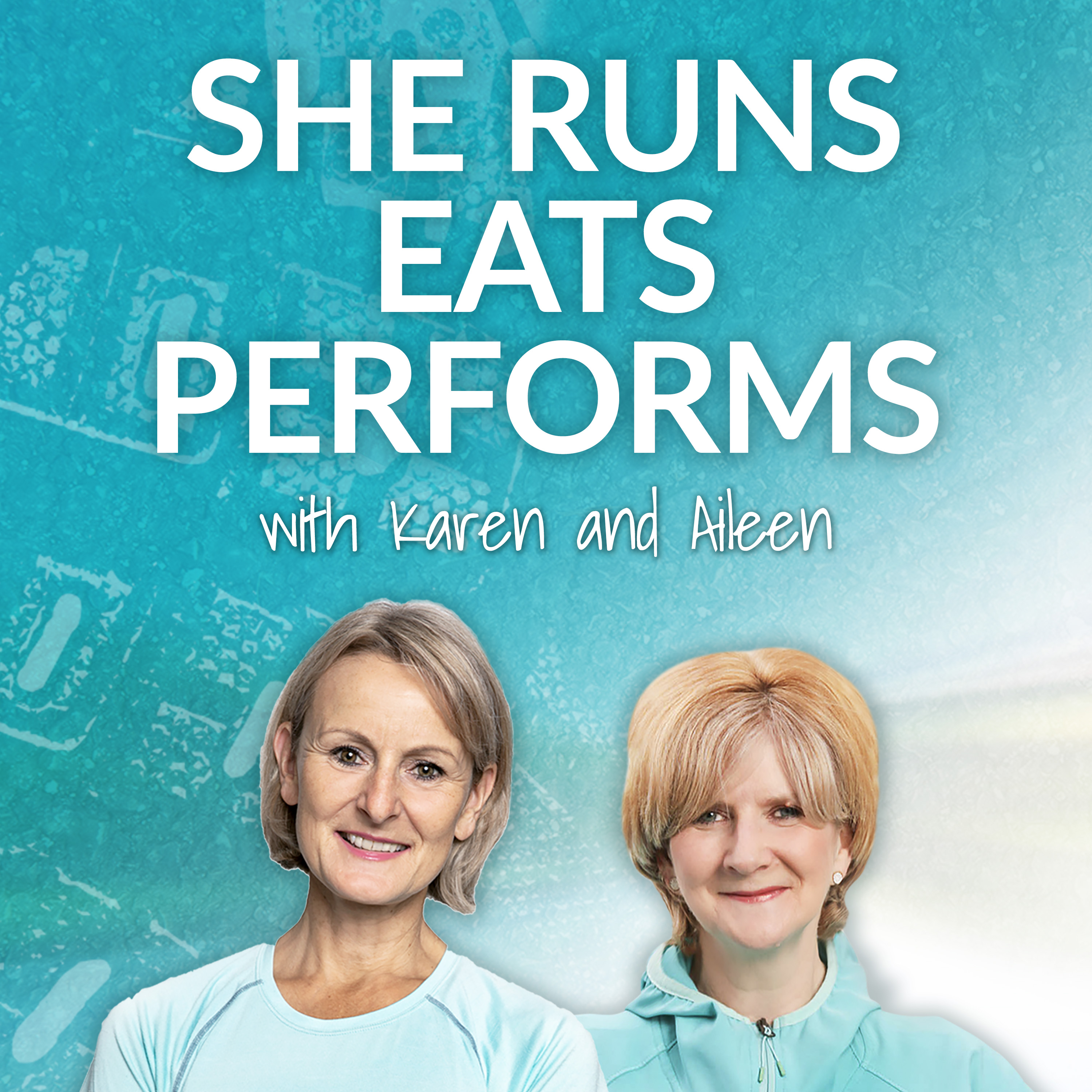Painkillers for Running?
Painkillers for Running?
We feel it’s important to bring about awareness about the potential health risks associated with chronic use of painkillers by endurance runners.
Some runners are using painkillers (paracetamol and non-steroidal anti inflammatories known as NSAIDS such as aspirin and ibuprofen) as a tool to over-ride symptoms of aches, sore muscles and injuries to help them continue to train or race.
Runners typically get into the habit of using over the counter painkillers to relieve sore muscles, to manage pain from injuries during a race, and to help reduce inflammation as a result of an injury.
Runners who use painkillers in this way may not be aware of the health risks or indeed alternatives.
We will talk about:
1. The background to chronic use of painkillers by endurance runners
2. The health risks to runners when using painkillers and the potential impact on performance
3. Alternatives to over -the-counter pain medication
SHOW NOTES
(03:59)
Why we are talking about painkillers today, plus the main types of over the counter medications, their mechanisms of action and how the body processes them, and safety precautions.
(12:43)
We consider how many runners typically are using over the counter medication and discuss if this medication is actually helping them.
(20:54)
We suggest that runners should be considering is how often are they taking these medications? Especially if say they're doing it consistently, during training. Or if they've maybe got a busy race schedule. They may think that they're just taking painkillers occasionally, but how often is occasionally? It’s important to know your intake of pain medication as it appears that it’s the chronic load which may lead to long-term health issues.
(21:40)
There's a female factor to consider here. How much pain medication are you using to manage period pains? As this may significantly increase your consumption of medication every month, without it necessarily being related to your running, but still contributing to longer-term health issues.
(22:49)
What guidance may runners follow when using pain management for acute and chronic health issues?
The advice seems to be “as a runner, it’s not really going to help you as a management tool for relieving chronic pain and inflammation”. It’s more likely to lead to you running through pain and potentially leading to longer-term injury or health problems.
We always have to remind people to follow medical advice – however general guidance on medical websites is
· For acute injuries, follow the advice of your medical practitioner or sports coach to manage an acute situation to minimise injury or to enable you to complete a specific sporting event
· If you are required to take these medications to manage a diagnosed health condition again follow advice from your health practitioner e.g. aspirin for blood thinning
· NSAIDS may impair kidney function and kidney circulation may be suppressed by dehydration so it’s advisable to maintain hydration and take NSAIDS at least 2 hours post run, and post urination, when you are rehydrated and only to take for a maximum of 4 days if you’re managing an injury
· Paracetamol – say you’re using for a pre run headache or a niggling chronic pain – then it’s advisable to take a regular dose before, during or after a run. Be aware that taking amount above daily dose is a risk to liver health. Again, advice is no longer than 4 days in a row.
(26:13)
What we all need to consider is that when we are injured the body’s natural response is pain and inflammation. Pain is part of the body’s alarm to tell us something is going on! The medication we have been talking about has its role, in helping decrease the perception of pain so it’s bearable for us, and in the case of NSAIDs to help decrease inflammation, which may help to enable muscle function and motion, both of which may be important to long-term recovery. An individual should take advice from their medical practitioner or sports injury specialist. In our view pain medication should be used in acute situations and only in chronic conditions under medical supervision.
(29:07)
An overview of the health risks associated with the chronic consumption of painkillers.
· Dehydration and kidney disorders–dehydration impacts on kidney function and the consumption of NSAIDs can decrease kidney function; they inhibit prostaglandins which help regulate blood flow to the kidneys. The physical exertion of endurance running combined with the use of NSAIDs and possible dehydration can be a dangerous mix.
· There is consensus that NSAIDs are a clear risk factor EAH exercise associated hyponatraemia - occurs when sodium levels in the blood are too low.
· Gut and Digestive Issues – typically chronic use of these medications may lead to damaging the stomach lining and digestive tract and also may affect the gut microbiome – all of which put us at risk of digestive disorders and digestive symptoms. Also people may have heard of Leaky Gut or Intestinal Permeability (IP) – these types of medication contribute to IP and Autoimmune conditions.
· A really interesting aspect of research is the effect of NSAIDS on skeletal muscle, tissues, ligaments and bones. Research indicates that
· NSAIDs may impede the synthesis of collagen
o COX-2 and prostaglandins are important mediators in the responsiveness and subsequent adaptation of connective tissues to mechanical stimuli.
o Athletes who regularly take NSAIDs before exercise may have reduced tissue adaptation potentially predisposing them to future injury
o Prolonged use of NSAIDs has the potential to reduce the rate of bone matrix production and tissue repair leading to delayed healing of fractures and of acute tendon, ligament, muscle injuries
o One study observed that the negative effect on musculoskeletal tissue healing can be diminished is the NSAID is consumed after exercise rather than pre or during exercise or in the absence of injury (which is typically what a lot of runners are doing)
(32:46)
The advice appears to be that if NSAID intervention is required (its use should be restricted to the minimal dose and for the minimal duration—for instance, during the early stage (up to 1 week) following injury when inflammatory signs and symptoms (i.e. active swelling and resting and/or night pain) are present. Taken during this stage, NSAIDs reduce pain and promote function following injury and there is evidence to suggest that short- term use limits the negative effects we have been discussing.
(39:10)
We talk about the natural nutritional alternatives to over-the-counter medication e.g.
· Promote a balanced immune system and minimise risks of a high inflammatory load (food, environment and lifestyle) and chronic inflammation
· Nutrients which work by inhibiting the inflammatory pathways in a similar way to NSAIDS are:
o Omega 3 Fatty Acids
o Turmeric
o Green Tea
o Resveratrol
o Chilli Pepper
o Tart Cherry Juice
o Bromelain
o Watermelon Juice
o Beetroot Juice
(49:25)
Athletes should consume these foods “chronically” to gain long-term benefits – so that means eating sufficient quantities regularly and consistently to get benefits. Also consuming a variety of these nutrients will help them work synergistically to modulate the pain and inflammation pathways.
(52:08)
Key Take Aways
1. Some runners are using painkillers as a tool to over-ride symptoms of aches, sore muscles and injuries to help them continue to train or race.
2. Typically, runners use Acetaminophen (paracetamol) or NSAIDS such as ibuprofen and aspirin.
3. When runners choose to consume painkillers chronically and in the absence of injury there are clear health risks related to developing:
· Liver and Kidney disorders
· Exercise associated hyponatraemia
· Gut and Digestive Issues
· Delayed healing of fractures and of acute tendon, ligament, muscle injuries
4. Consider the amount of medication you consume - it’s the chronic load which appears to do the most long-term damage. A FEMALE factor to consider is how much pain medication are you using to manage period pains.
5. Follow the safety guidance (read medication leaflet) re: dosage and quantity over a 24-hour period.
6. NSAIDs should not be used prophylactically (in the absence of injury) and that they do not represent a solo therapy or a substitute to active rehabilitation. They may be used in acute situations and under medical supervision only for chronic conditions.
7. NSAIDS may impair kidney function and kidney circulation may be suppressed by dehydration so it’s advisable to maintain hydration and take NSAIDS at least 2 hours post run, and post urination, when you are rehydrated and only to take for a maximum of 4 days if you’re managing an injury.
8. Paracetamol – used for example for a pre-run headache or a niggling chronic pain – then it’s advisable to take a regular dose before, during or after a run. Be aware that taking amount above daily dose is a risk to liver health. Again, advice is no longer than 4 days in a row.
9. It’s important to reduce your inflammatory load focusing on an anti-inflammatory food plan and supportive lifestyle – this will help your immune system work optimally and minimise risk of chronic inflammation.
10. Foods and nutrients such as Omega 3 Fatty Acids, Turmeric, Green Tea, Resveratrol, Chilli Pepper (Capsaicin), Tart Cherry Juice, Bromelain (derived from pineapple), Watermelon Juice, Beetroot Juice work by inhibiting the inflammatory pathways in a similar manner as NSAIDs.
11. A nutritional approach is to eat a variety of these foods in sufficient quantities regularly and consistently to get benefits.
12. Some of the nutrients may be used therapeutically in supplement form under the supervision of a qualified nutritionist or health care practitioner.
Related Episodes:
Endurance Running and Immune System
Disclaimer:
The suggestions we make during this episode are for guidance and
advice only, and are not a substitute for medical advice or treatment.
If you have any concerns regarding your health, please contact
your healthcare professional for advice as soon as possible.
Aileen Smith and Karen Campbell met at as nutrition students (Institute for Optimum Nutrition, London) and became lifelong friends and nutritional buddies! Both have a love of running and a passion for nutrition, delicious food and healthy living.
Together they host RUNNERS HEALTH HUB. A place for like-minded runners who are looking for simple ways to support running performance, energy, endurance, and general great health.
We are excited to be able to share our expertise, experience and short cuts with you. We hope you'll join us again. If you'd like to know more about us and She Runs Eats Performs please check out our TRAILER.
If you're ready to make learn more about how you may introduce easy nutrition into your running and training plan join our Easy Nutrition For Healthy Runners Online Programme for short videos, recipes, downloads and LIVE training and Q&A.
As a THANK YOU to you as one of our valued listeners, we have a special offer for you use COUPON CODE POD to get 33% discount off the full price which brings the price to £199.
If you’d like help from Karen and Aileen to design a personalised sports nutrition plan for your running - please contact them at hello@runnershealthhub.com
Happy Running!
Aileen and Karen

